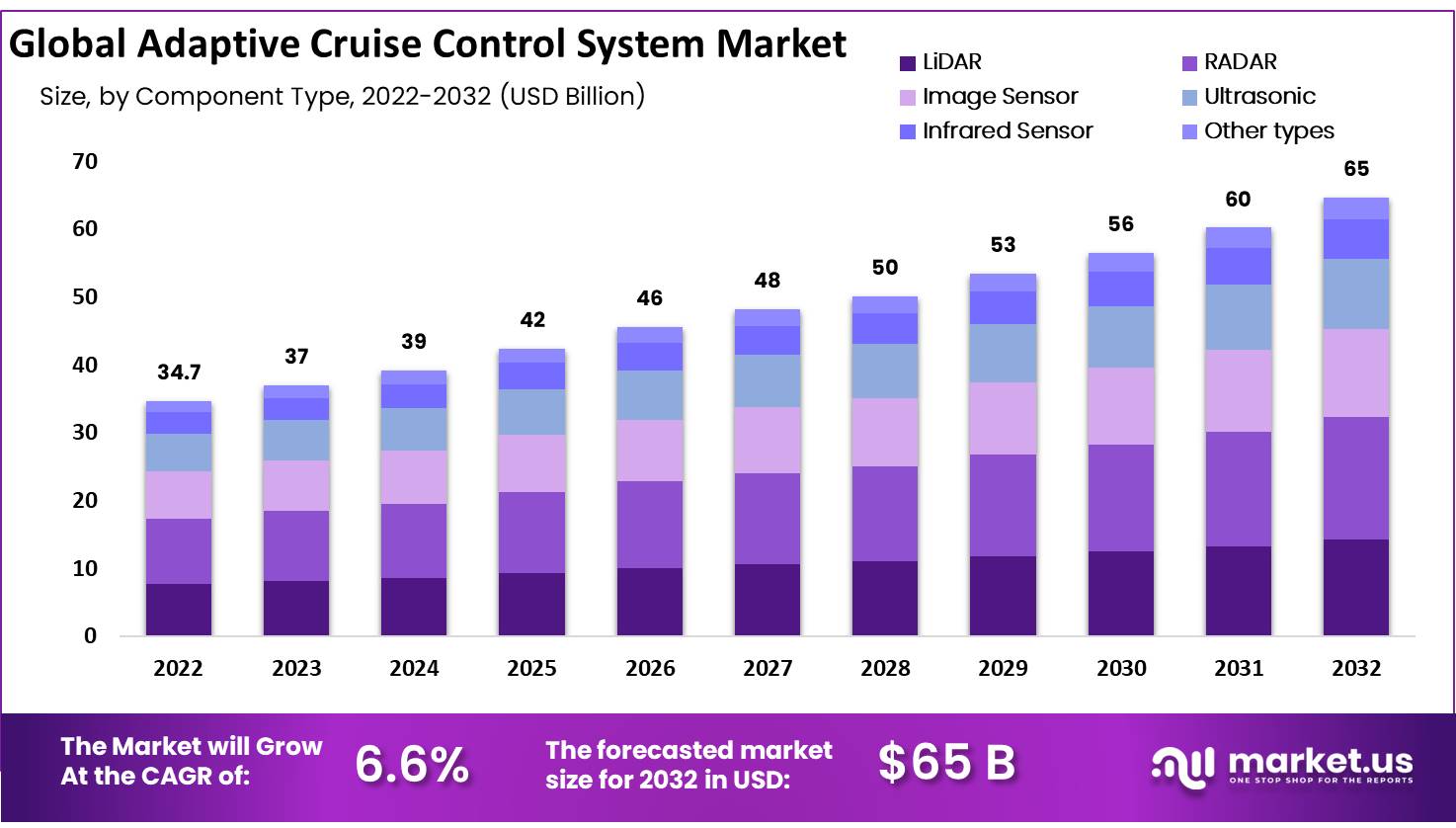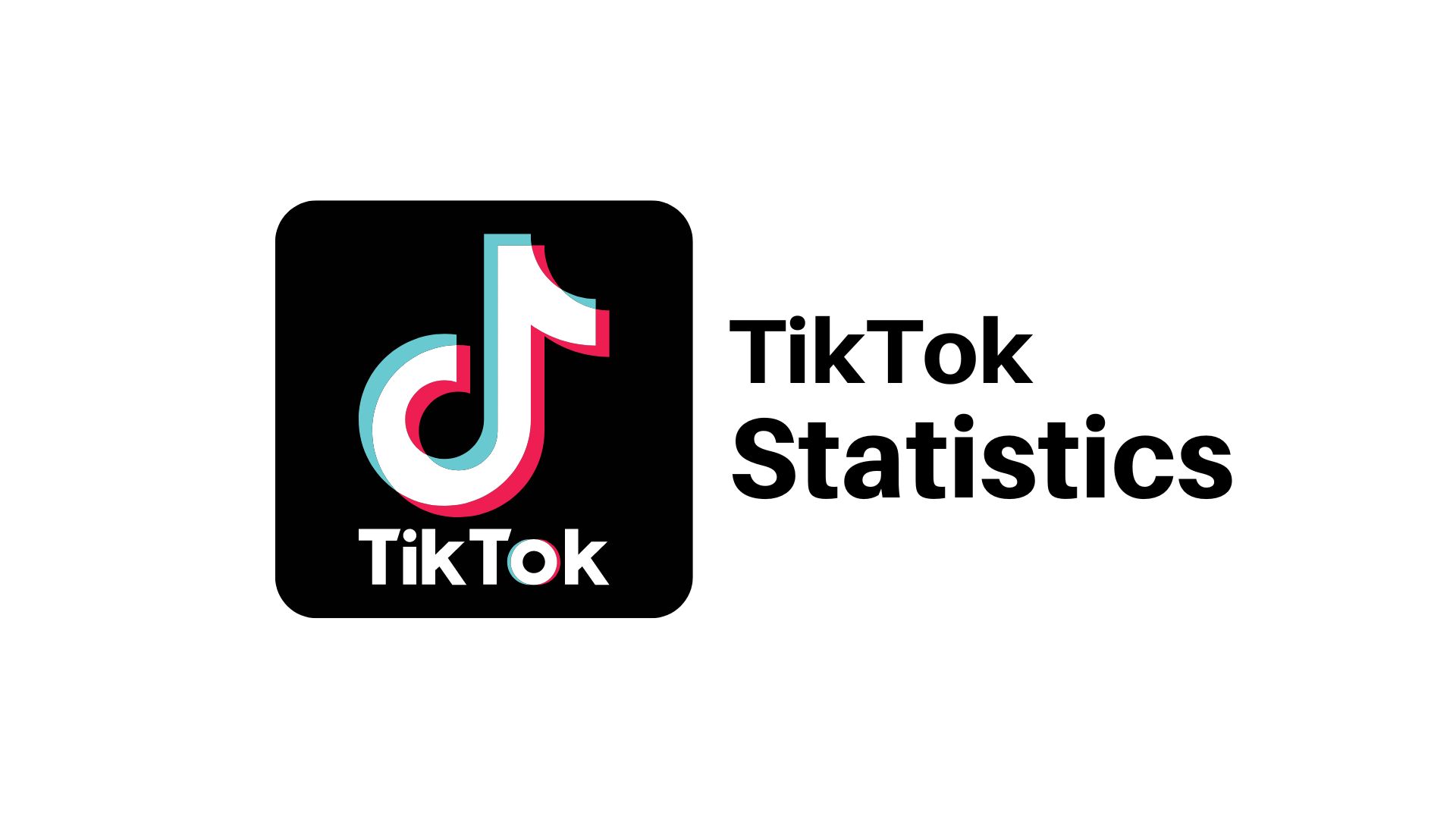Adaptive Cruise Control System Market Size To Grow USD 65 Billion By 2032 – Market.us

Page Contents
Market Overview
Published Via 11Press : The Adaptive Cruise Control (ACC) System Market refers to an industry that develops and provides adaptive cruise control technology for vehicles. Adaptive cruise control (ACCR) is an advanced driver assistance system (ADAS), developed to increase driving safety and comfort.
The Adaptive Cruise Control System Market Size Was To Reach USD 34.7 Billion In 2022 And is Projected To Reach a Revised Size Of USD 65 Billion By 2032, Growing At A CAGR of 6.6%
An adaptive cruise control system uses sensors, radar, or cameras to identify the distance and speed of vehicles ahead. It then adjusts the vehicle's speed accordingly in order to keep a safe following distance – either slowing or speeding up as necessary – helping maintain constant speeds without collision by automatically adapting to traffic flows.
To Get Additional Highlights On Major Revenue-Generating Segments, Request the Adaptive Cruise Control System Market Sample Report At – https://market.us/report/adaptive-cruise-control-system-market/request-sample/

Recent years have witnessed exponential growth for adaptive cruise control systems due to factors like increasing vehicle safety regulations and rising consumer desire for advanced driver assistance features, coupled with an emphasis on decreasing accidents caused by driver error.
Key components of adaptive cruise control system markets include sensors, radar systems, cameras, ECUs, and software that work together to enable the detection of vehicles and calculate distance and speed differentials before controlling acceleration and braking accordingly.
Key Takeaways
- Rising Demand for Advanced Driver-Assistance Systems (ADAS): The adaptive cruise control market is driven by consumer preference for vehicles equipped with adaptive cruise control either standard or optional features, reflecting increased consumer interest in technologies to increase vehicle safety and enhance driving comfort. ADAS technologies play a vital role in vehicle safety while improving driving comfort; consumers increasingly prefer vehicles featuring adaptive cruise control as standard or optional features.
- Vehicle Safety Regulations: Strict vehicle safety regulations imposed by governments and regulatory bodies worldwide have fostered adaptive cruise control technology adoption. These laws aim to decrease accidents caused by driver error on roads while improving overall road safety – driving market expansion as a result.
- Integration of Advanced Sensors: Market trends indicate increasing incorporation of advanced sensors like radar and LiDAR systems to boost adaptive cruise control system capabilities. Such advanced sensors facilitate better vehicle, pedestrian, and obstacle detection thus improving system accuracy and responsiveness.
- Expanding Electric Vehicle Market: As more EVs enter the marketplace, their growing popularity presents adaptive cruise control system manufacturers with opportunities for market expansion. Manufacturers have begun including advanced driver assistance features – like adaptive cruise control – into these vehicles to improve driving experiences and meet consumer expectations.
Regional Analysis
- North America: North America holds an outsized share in the adaptive cruise control system market. This region can be distinguished by stringent vehicle safety regulations, increased consumer awareness of and adoption of adaptive cruise control system technology as well as prominent automotive manufacturers present.
- Europe: Europe is another key market for adaptive cruise control systems, thanks to a robust automotive sector and strict vehicle safety regulations in European nations that have led to their widespread implementation and acceptance of adaptive cruise control technologies like adaptive radar cruise control.
- Asia Pacific: Asia Pacific has experienced significant expansion of the adaptive cruise control system market due to a rise in vehicle production, improved infrastructure development, and rising disposable income levels among its citizens. Countries such as China, Japan South Korea, and India have all led this market expansion owing to an increasing need for vehicle safety solutions provided by adaptive cruise control system technologies and an emphasis on improving consumer disposable income levels.
- Latin America: Latin America is an emerging market for adaptive cruise control systems (ACC). Countries like Brazil, Mexico, and Argentina are witnessing increased consumer awareness and acceptance of these ADAS technologies due to a growing automotive sector and consumer desire for advanced safety features in vehicles. This growth of market momentum in this part of the world can only continue.
- Middle East and Africa: Adaptive cruise control system sales in this part of the world have seen steady expansion as more countries like United Arab Emirates, Saudi Arabia, and South Africa embrace advanced technologies and focus on road safety improvement. These countries lead the market.
Drivers
- Rising Prioritization of Vehicle Safety: Vehicle safety has emerged as a critical driver in the adaptive cruise control market. Governments, regulatory bodies, and consumers are prioritizing features like adaptive cruise control to decrease incidents due to driver error.
- Rising Consumer Demand for ADAS Technologies: There has been an upswing in consumer interest in vehicles featuring advanced driver assistance systems (ADAS), such as adaptive cruise control. Consumers appreciate the increased safety, convenience, and comfort afforded by these ADAS systems leading to their widespread adoption in more vehicles featuring adaptive cruise control technologies.
- Governments and regulatory bodies worldwide are adopting more stringent vehicle safety regulations, mandating that advanced features be included in vehicles. Such mandates encourage automotive manufacturers to incorporate adaptive cruise control systems as part of compliance regulations.
- Accident Prevention and Collision Mitigation: Adaptive cruise control systems are intended to both prevent accidents and lessen their severity by automatically adjusting vehicle speed and maintaining safe following distance settings, helping drivers avoid rear-end collisions while improving road safety overall.
Market Segmentation
Based on Component Type
- LiDAR
- RADAR
- Image Sensor
- Ultrasonic
- Infrared Sensor
- Other types
Based on Vehicle Type
- Passenger Cars
- Commercial Vehicles
Based on End-Use
- OEMs
- Aftermarket
Key Players
- Autoliv Inc
- Continental Ag
- Delphi Automotive PLC
- Denso Corporation
- Ford Motor Company
- Hyundai Mobis
- Magna International
- Other Key Players
To Understand How Our Report Can Bring a Difference To Your Business Strategy, Inquire About A Brochure at – https://market.us/report/adaptive-cruise-control-system-market/#inquiry
Opportunities
- As semi-autonomous and autonomous vehicle: interest continues to surge, adaptive cruise control system vendors see significant opportunities. As vehicles advance toward greater levels of automation, adaptive cruise control will play a crucial role in providing drivers with safe and enjoyable driving experiences.
- Integration With Connected Car Technology: Integrating adaptive cruise control systems with connected car technology opens up numerous new avenues. Connected cars can leverage real-time traffic and road condition data to optimize adaptive cruise control performance for improved traffic flow management and enhanced safety.
- Emerging Market Expansion: Emerging markets such as Asia, Latin America, and Africa present enormous growth potential for adaptive cruise control system makers in these regions. Urbanization rates have skyrocketed, disposable income has seen substantial increases, and consumers increasingly demand vehicles equipped with driver-assist features like adaptive cruise control.
- Collaborations and Partnerships: Joining forces between automotive manufacturers, technology suppliers, research institutions, and others can spur innovation and open up new market opportunities within adaptive cruise control system markets. Partnerships could focus on developing advanced sensor technologies; improving system integration; or even further increasing performance and functionality for adaptive cruise control systems.
Challenges
- Limited Consumer Education and Awareness: Some consumers may misunderstand the capabilities and benefits of adaptive cruise control systems, leading to lower adoption rates and slower market expansion. Therefore, efforts must be made to educate them about their functionality, safety benefits, proper use, and proper implementation to address this challenge.
- High Costs: Installing adaptive cruise control systems into vehicles may present high integration costs. This poses an obstacle for budget-minded consumers and manufacturers who must balance cost considerations against offering competitive prices.
- Technical Limits: Adaptive cruise control systems may encounter technical restrictions in some driving scenarios or weather conditions. Factors like adverse weather, poor road markings, and complex traffic situations could negatively impact performance and accuracy; in such instances, continuous advancement in sensor technology and software algorithms is required in order to overcome such challenges.
- Standardization and Compatibility: Ensuring standardization and compatibility across various adaptive cruise control systems can be challenging. Different manufacturers often create their own proprietary solutions, creating obstacles to interoperability with other vehicles or infrastructure. Establishing industry-wide protocols may facilitate seamless integration and compatibility.
Recent Development
- Advanced Sensor Technologies: There have been significant advancements in sensor technologies used by adaptive cruise control systems. Manufacturers are including higher resolution radar and LiDAR sensors as well as camera systems into these systems to increase detection capability, accuracy, and reliability of detection processes.
- Integration With Artificial Intelligence: Integrating artificial intelligence (AI), such as machine learning and computer vision techniques, into adaptive cruise control systems has proven highly successful at improving their performance. AI algorithms help enhance object recognition, adaptive behavior, and predictive capability resulting in more responsive system operation for improved efficiency and responsiveness.
- Cooperative Adaptive Cruise Control (CACC): Cooperative adaptive cruise control is an emerging technology that enables vehicles to communicate among themselves and coordinate their speeds for better traffic flow. CACC systems enhance adaptive cruise control's capabilities for more pleasant driving experiences and efficient use of road space.
Report Scope
| Report Attribute | Details |
| The market size value in 2023 | USD 34.7 Bn |
| Revenue Forecast by 2032 | USD 65 Bn |
| Global Market Growth Rate (2023 to 2032) | CAGR Of 6.6 % |
| Regions Covered | North America, Europe, Asia Pacific, Latin America, and Middle East & Africa, and Rest of the World |
| Historical Years | 2017-2022 |
| Base Year | 2022 |
| Estimated Year | 2023 |
| Short-Term Projection Year | 2028 |
| Long-Term Projected Year | 2032 |
FAQs
Q1: What is an adaptive cruise control system?
A1: An adaptive cruise control system is an advanced driver-assistance system (ADAS) technology that automatically adjusts a vehicle's speed to maintain a safe following distance from the vehicle ahead. It uses sensors, radar, or cameras to detect the distance and speed of vehicles, enabling the vehicle to accelerate, decelerate, or brake accordingly.
Q2: How big is the Adaptive Cruise Control System Market?
A2: The global Adaptive Cruise Control System Market size was estimated at USD 34.7 billion in 2022 and is expected to reach USD 65 billion in 2032.
Q3: What is the Adaptive Cruise Control System Market growth?
A3: The global Adaptive Cruise Control System Market is expected to grow at a compound annual growth rate of 6.6%.
Q4:Who are the key companies/players in the Adaptive Cruise Control System Market?
A4:Some of the key players in the Adaptive Cruise Control System Markets are Autoliv Inc, Continental Ag, Delphi Automotive PLC, Denso Corporation, Ford Motor Company, Hyundai Mobis, Magna International, Other Key Players
Q5: How does adaptive cruise control work?
A5: Adaptive cruise control systems use sensors to measure the distance and speed of vehicles in front. Based on this information, the system adjusts the vehicle's speed to maintain a safe following distance. It can automatically slow down or accelerate the vehicle to match the speed of the vehicle ahead, providing a more relaxed and convenient driving experience.
Q6: What are the benefits of adaptive cruise control?
A6: Adaptive cruise control systems offer several benefits, including increased safety by maintaining a safe following distance, reduced driver fatigue by assisting with speed adjustments, improved traffic flow and efficiency, and enhanced driving comfort through automated speed control.
Contact
Global Business Development Team – Market.us
Market.us (Powered by Prudour Pvt. Ltd.)
Send Email: [email protected]
Address: 420 Lexington Avenue, Suite 300 New York City, NY 10170, United States
Tel: +1 718 618 4351
Website: https://market.us/
Content has been published via 11press. for more details please contact at [email protected]
The team behind market.us, marketresearch.biz, market.biz and more. Our purpose is to keep our customers ahead of the game with regard to the markets. They may fluctuate up or down, but we will help you to stay ahead of the curve in these market fluctuations. Our consistent growth and ability to deliver in-depth analyses and market insight has engaged genuine market players. They have faith in us to offer the data and information they require to make balanced and decisive marketing decisions.



